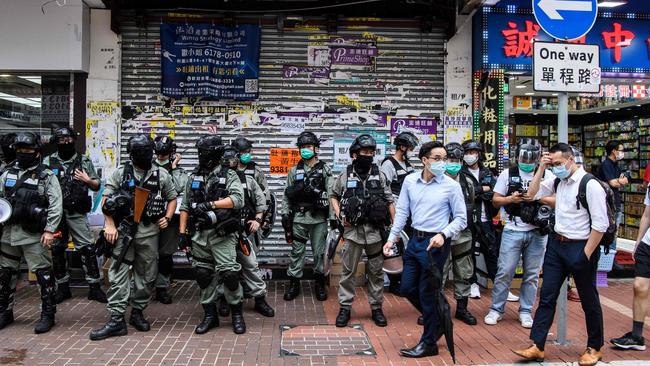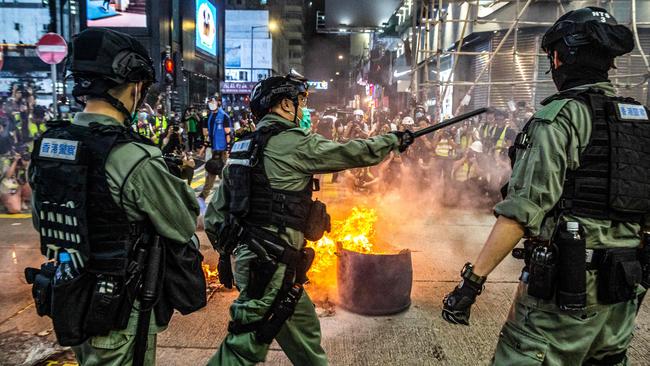Patrick Carlyon: Threats, tweets and tantrums replace diplomacy
Human rights abuses in America do not match human rights abuses in China. For China to gloat about the dreadful scenes across dozens of US cities overlooks critical differences, writes Patrick Carlyon.
We live in strange times when the two global superpowers are driven by petulance and pique.
China and the United States both appear to be run by tweets and threats. Why bother with diplomacy and shows of intellectual honesty when tantrums can serve instead?
Yet comparisons between the nations run only so far. Human rights abuses in America do not match human rights abuses in China. For China to gloat about the dreadful scenes across dozens of American cities overlooks critical starting points.
America has always fallen prone to hypocrisy and arrogance, from its gun laws to its God-fearing preachiness. These fault lines have widened under a leader who lacks depth, compassion and insight.
But Donald Trump, as aberrant as history is doomed to find him, is constrained by a framework of decency. Such as the right to protest. And freedom of speech and the pursuit of happiness.
China’s leering at America’s troubles sits badly given its depraved indifference to the global community. China failed to contain a worldwide pandemic because it hid the truth about the virus origins. Saving face — as well as stockpiling medical and health supplies — has cost the world at least 387,000 lives.
Yet China now postures, as if it has claims to moral superiority. America is divided and xenophobic, according to a Chinese student quoted in the Chinese state-run Global Times.
The same article quoted many Chinese voices in its critique of United States affairs. They shared a gobsmacking sameness in their clumsy leaps of logic.

One university professor spoke of America’s “controversial social issues including racial and gender discrimination” — the sorts of issues, mind, that cannot be voiced under a totalitarian regime.
Another professor declared China had “little racial issues”. Really? Did anyone ask the Taiwanese and Tibetans?
China’s power is built on secrecy, deceit and punishment. Its bullying of Australia, and boycotting of sectors of trade, smacks of the overgrown kid in the playground who cannot win his way.
Its about-face on Hong Kong has garnered worldwide outrage. Hu Xijin, editor-in-chief of the Global Times, has compared protests in the US with those in Hong Kong.
“There are of course different reasons for the riots, but their similarities are overwhelming: they all defy the law, subvert order and are destructive,” he said.
He did not point out Hong Kong’s unrest was sparked by China’s crude rejection of Hong Kong’s long-held freedoms.
China’s “revenge observation”, as the Global Times noted, has been touted as a “propaganda win” that depicts the “true face” of America.
Such raw perspectives of America were presented after the Rodney King beating in Los Angeles in 1992. Then, as now, looting and unchecked violence hijacked peaceful outrage.
Yet these protests aim to enshrine human rights. They are an imperfect tool, dripped in blood, but they shine in defiance of injustice.
They have also served as an example. The George Floyd tragedy has sparked touchstone reflections from Australia to France. Its legacy may lie in the untold reforms it bring about in many countries.
What examples does China offer the world? Not one person has been “disappeared” in America, that is, forcibly removed or killed because they do not parrot the government line.
In China, at least three virus whistleblowers have been “disappeared”. Human rights groups have speculated they have been tortured in detention centres usually reserved for the torture of activists labelled as enemies of the state.
“Disappearing” in China happens with a late-night knock at the door, conjuring comparisons with 1930s Germany. It is one example of a Chinese system built on cover-ups and intimidation.

If Victorians can laugh off allusions to being chewing gum on a Chinese shoe, as depicted in the Chinese press, they are instinctively wary when a state government muddles secretive deals with China’s Belt and Road Initiative.
For China’s propensity for foreign interference is unmatched. Amnesty International said in its World Report 2020 that China is unlike any other government because it “flexes its political muscles with such vigour and determination to undermine the international human rights standards and institutions that could hold it to account”.
China’s persecution of the Uyghur people is a scandal that may not be properly recognised, as with the Rwandan genocide of the 1990s, until after the event.
Since 2017, China has mass detained Uyghurs and other Muslim ethnic groups. More than a million people are thought to have been placed in “vocational training” centres and subjected to human rights abuses.
China has not settled for rounding up these poor people.
As Amnesty found earlier this year: “Even when Uyghurs and members of other minorities flee persecution in Xinjiang, they are not safe. The Chinese government will find ways to reach them, to intimidate them and, ultimately, attempt to bring them back to face a grim fate — including by pressuring other governments to return them.”
Human rights issues are a crowded playing field right now. Yet the international gaze will eventually return to China’s appalling record on freedom of speech and civil liberties.
Surely someone, somewhere, has already crafted the next tagline: “Uyghur Lives Matter.”
Patrick Carlyon is a Herald Sun columnist

